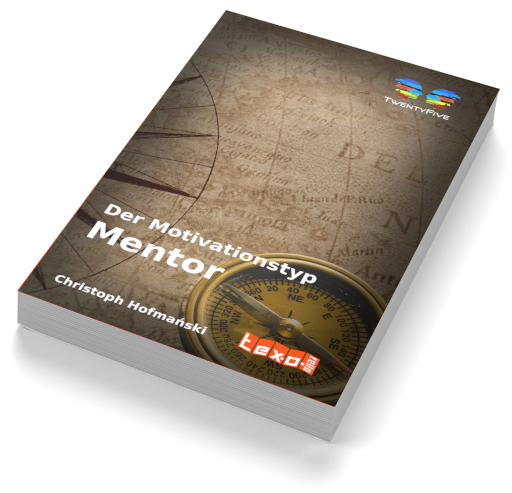Mentor
 Mentors are achievement-oriented, supportive people. They want to share their knowledge with others and encourage their “students.” They like to give from the abundance of their knowledge and skills. Those who communicate with a mentor should feel invited to address their own unanswered questions or problems.
Mentors are achievement-oriented, supportive people. They want to share their knowledge with others and encourage their “students.” They like to give from the abundance of their knowledge and skills. Those who communicate with a mentor should feel invited to address their own unanswered questions or problems.
A mentor’s strongest motivations are:
Communication
 If you want to know more about the mentor, use the pocket book: The motivational type “mentor” (german edition). Here you will get the important information about the basic needs and about the typical characteristics, relationships and communication of the mentor. In addition, you will read what the mentor can do for his well-being, how he learns most easily, and which professions suit him. The book also includes a checklist for all important decisions.
If you want to know more about the mentor, use the pocket book: The motivational type “mentor” (german edition). Here you will get the important information about the basic needs and about the typical characteristics, relationships and communication of the mentor. In addition, you will read what the mentor can do for his well-being, how he learns most easily, and which professions suit him. The book also includes a checklist for all important decisions.
In order to make communicative contexts transparent and understandable, the mindful communication badge has been developed as an intuitive helper.
 Would you like to get your own mindful communication badge for the signum of your emails? Just invest five minutes at https://mcb.senseaition.com. A mindful communication badge is of course free of charge.
Would you like to get your own mindful communication badge for the signum of your emails? Just invest five minutes at https://mcb.senseaition.com. A mindful communication badge is of course free of charge.
 If you want a detailed analysis of your personal motivations and basic needs and would like to go deeper into TwentyFive, you can purchase a motivation portrait according to TwentyFive. You can find explanations of TwentyFive in various books and, of course, from any specialist with a psychological education.
If you want a detailed analysis of your personal motivations and basic needs and would like to go deeper into TwentyFive, you can purchase a motivation portrait according to TwentyFive. You can find explanations of TwentyFive in various books and, of course, from any specialist with a psychological education.
With the tools of sense.AI.tion GmbH there are possibilities to use TwentyFive in everyday work. These facilitate processes of recruiting, personnel development, personnel management. In addition, the tools make communication transparent, understandable and bring you closer to customers and partners.
